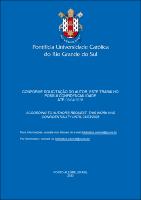| Share record |


|
Please use this identifier to cite or link to this item:
https://tede2.pucrs.br/tede2/handle/tede/10697| Document type: | Tese |
| Title: | A justiça restaurativa como via de tutela penal nos impasses de conjugalidade violenta em face das implicações criminais da Lei 11.340/2006 : (im)possibilidades e desafios |
| Author: | Silva, Wirna Maria Alves da  |
| Advisor: | Azevedo, Rodrigo Ghiringhelli de |
| Abstract (native): | A violência contra a mulher, prática antiga, mas ainda muito presente na sociedade, faz nascer o sentimento de medo e insegurança, tornando-se um grave problema que transpõe a camada social. No sistema penal pátrio, a principal dialética para lidar com o panorama de criminalidade é a punição, configurando vertentes que conduzem a justiça criminal. Nosso estudo busca investigar as práticas executadas no judiciário brasileiro para, então, responder: “É cabível o uso da Justiça Restaurativa nos casos de conjugalidade violenta em face das implicações criminais da Lei 11.340/2006 e, nessa perspectiva, qual o paradigma de justiça que orienta tais práticas no âmbito dos juizados especiais de violência doméstica e familiar contra a mulher para o reconhecimento da vítima como sujeito de direito, a partir de uma cidadania feminina?” A tese suscita uma comparação entre duas formas de justiça, ao passo que discute a necessidade de superação da resposta monológica do modelo jurisdicional, fundamentada na neutralização da vítima e em sua consequente expropriação do conflito pelo Estado. Tal preocupação conjuga-se ao exame dos riscos da articulação entre duas racionalidades distintas, que se refletem diretamente nos sujeitos: vítima/agressor/comunidade e a necessidade de compor com outros setores em prol da obtenção de acordos e a probabilidade de resultados, ressaltando a JR, enquanto possível, como acesso impulsionador da transição do paradigma da culpa para o da responsabilidade. Utiliza-se o método de abordagem qualitativa, exame de estudos, relatórios e documentos que aliam a JR e a violência doméstica e familiar contra a mulher. A hipótese para conduzir a investigação apoia-se na consonância com os processos de mudança social e cultural por meios educacionais e reflexivos em um espaço de acolhimento, com o fito de abrigar necessidades a fim de proporcionar superação, segurança e a autonomia, mas, para tanto compreende a necessidade de entender os desafios e potencialidades no sistema jurídico pátrio. |
| Abstract (english): | Violence against women, a remote practice and very present in society, gives rise to the feeling of fear and insecurity, becoming a serious problem that crosses the social layer, and in the country's penal system, the main dialectic to deal with the criminality panorama is through punishment, aspects that lead to criminal justice. Our study seeks to investigate the practices carried out in the Brazilian judiciary, and then answer: “Is it appropriate to use Restorative Justice in cases of violent conjugality in the face of the criminal implications of Law No. 11.340/2006 and in this perspective, what is the paradigm of justice that guides such practices within the scope of special courts of domestic and family violence against women for the recognition of the victim as a subject of law, based on female citizenship?” The thesis raises a comparison between two forms of justice while discussing the need to overcome the monological response of the jurisdictional model, based on the neutralization of the victim and its consequent expropriation of the conflict by the State. This concern is combined with the examination of the risks of articulation between two different rationales, which directly reflect on the subjects: victim/aggressor/community and the need to collaborate with other sectors in order to obtain agreements and the probability of results, emphasizing the JR, while possible, as a booster of the transition from the paradigm of guilt to that of responsibility. We will use a qualitative approach method, examining studies and reports and documents that combine JR and domestic and family violence against women. The hypothesis to conduct the investigation is based on the consonance with the processes of social and cultural change through educational and reflective means in a welcoming space, with the aim of sheltering needs in order to provide: overcoming, security and autonomy, but, for that it is necessary to understand the challenges and potentialities in the national legal system. |
| Keywords: | Justiça Restaurativa Conjugalidade Violenta Violência Doméstica e Familiar Contra a Mulher Cidadania Feminina Lei nº 11.340/2006 Lei Maria Da Penha Restorative Justice Violent Conjugality Domestic and Family Violence Against Women Female Citizenship Law 11.340/2006 Maria da Penha Law |
| CNPQ Knowledge Areas: | CIENCIAS SOCIAIS APLICADAS::DIREITO |
| Language: | por |
| Country: | Brasil |
| Publisher: | Pontifícia Universidade Católica do Rio Grande do Sul |
| Institution Acronym: | PUCRS |
| Department: | Escola de Direito |
| Program: | Programa de Pós-Graduação em Ciências Criminais |
| Access type: | Acesso Aberto |
| Fulltext access restriction: | Trabalho será publicado como artigo ou livro |
| Time to release fulltext: | 60 meses |
| Date to release fulltext: | 03/04/2028 |
| URI: | https://tede2.pucrs.br/tede2/handle/tede/10697 |
| Issue Date: | 20-Dec-2022 |
| Appears in Collections: | Programa de Pós-Graduação em Ciências Criminais |
Files in This Item:
| File | Description | Size | Format | |
|---|---|---|---|---|
| TES_WIRNA_MARIA_ALVES_DA_SILVA_CONFIDENCIAL.pdf | WIRNA_MARIA_ALVES_DA_SILVA_TES_ | 372.24 kB | Adobe PDF |  Download/Open Preview |
Items in DSpace are protected by copyright, with all rights reserved, unless otherwise indicated.




